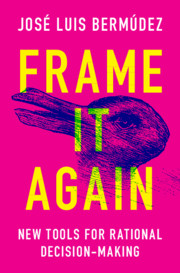Book contents
- Frame It Again
- Frame It Again
- Copyright page
- Contents
- Figures
- Tables
- Acknowledgments
- 1 Priming the Pump: Framing Effects and the Litany of Human Irrationality
- 2 Framing: The Classic Experiments
- 3 Where the Rubber Hits the Road: Investors, Frames, and Markets
- 4 Juliet’s Principle
- 5 Rational Frames?
- 6 Agamemnon and Climate Change
- 7 Framing Temptation and Reward: The Challenges of Self-Control
- 8 Chickens and Chariot Races: Framing in Game Theory
- 9 Fair’s Fair: Framing for Cooperation and Fairness
- 10 Getting Past No: Discursive Deadlock and the Power of Frames
- 11 Opening the Door to Non-Archimedean Reasoning
- Appendix Frames in the Brain
- Bibliography
- Index
6 - Agamemnon and Climate Change
Published online by Cambridge University Press: 15 October 2020
- Frame It Again
- Frame It Again
- Copyright page
- Contents
- Figures
- Tables
- Acknowledgments
- 1 Priming the Pump: Framing Effects and the Litany of Human Irrationality
- 2 Framing: The Classic Experiments
- 3 Where the Rubber Hits the Road: Investors, Frames, and Markets
- 4 Juliet’s Principle
- 5 Rational Frames?
- 6 Agamemnon and Climate Change
- 7 Framing Temptation and Reward: The Challenges of Self-Control
- 8 Chickens and Chariot Races: Framing in Game Theory
- 9 Fair’s Fair: Framing for Cooperation and Fairness
- 10 Getting Past No: Discursive Deadlock and the Power of Frames
- 11 Opening the Door to Non-Archimedean Reasoning
- Appendix Frames in the Brain
- Bibliography
- Index
Summary
We now have a framework for thinking about framing effects and rationality. We saw that framing effects can involve quasi-cyclical preferences. Someone has quasi-cyclical preferences when they prefer A to B and B to C, despite knowing that A and C are different ways of framing the same outcome. So, the question of whether framing effects can be rational is really the question of whether it can be rational to have quasi-cyclical preferences. This chapter presents what I take to be compelling reasons for thinking that it can be rational to have quasi-cyclical preferences. To see why, we need to broaden our perspective on decision-making to include factors not typically taken into account by theories of rational choice. I want to focus on two in particular.
- Type
- Chapter
- Information
- Frame It AgainNew Tools for Rational Decision-Making, pp. 113 - 137Publisher: Cambridge University PressPrint publication year: 2020

